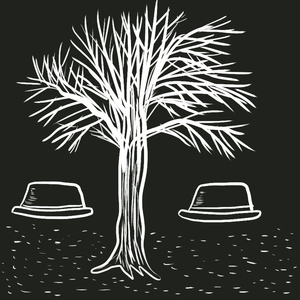Waiting for Godot. Image courtesy of enotes.com
Jo Baker’s A Country Road, A Tree (2016) is an exciting and moving novel detailing Samuel Beckett’s experiences in occupied France during World War Two. Though it is a fictionalized account, Baker did extensive research before writing the book, and the final product is a strange and beautiful mixture of historical events and imagined or inferred encounters. The characterizations of real people in Beckett’s life are particularly illuminating: we meet his mother, his partner Suzanne, and his many friends and acquaintances in Paris — James Joyce and Nora Barnacle included.
Though the book is wonderful in its own right, an added treat for us Joyceans is the number of references to both Ulysses and Finnegans Wake — the latter of which Beckett helped Joyce to transcribe and edit, due to Joyce’s failing eyesight at the time. At various points in the text, the character of Joyce sings and plays both “The Salley Gardens” and “Croppy Boy” (Baker, 36); he refers to the central area of France as its “omphalos” (61); and at one point — when food is scarce — Beckett thinks of “a fried kidney; a gorgonzola sandwich” along with the other nourishment he craves (140). Beckett also regularly refers to Joyce himself as “Shem,” one of the pivotal characters in Finnegans Wake.

Samuel Beckett, painting by Reginald Gray.
Though these small moments are certainly enjoyable, what I found even more interesting was the portrayal of Joyce himself – who was, at this point, in ill health and nearing the end of his life. When Joyce talks in the novel, Beckett considers how “the old accent and the light voice feel like home,” and notes that “whatever he is saying there is always wonder in it, in being in the flow of his talk” (37). When Joyce sings, Beckett thinks about “that astonishing quavering voice” and “all that brilliance tied to a failing body” (82). When Joyce dies, and Beckett grieves, he states that “with Shem gone, everything is different. After Joyce, what is the point of writing? What else is there to say?” (83).
Much of the book is dedicated to Beckett figuring out the answer to this question — not through scribbling away hunched over at a desk, but through the extraordinary events he witnessed and through the things he had to do to survive while on the run from the Gestapo. Beckett was hugely inspired by Joyce’s writing and owes him a great deal, but compared to Joyce’s grandeur and extravagant use of language, Beckett’s later works tend towards stark simplicity. Jo Baker gives us insight into Beckett’s life, which therefore gives us insight into Beckett’s work after World War Two.
A Country Road, a Tree is an intriguing and beautifully written book, and I highly recommend it. Personally, I can’t wait to reread Waiting for Godot with this new knowledge about Beckett’s life — though the play is of course too puzzling and loaded with meaning to be read through a single lens, Jo Baker’s novel has given me new ways of looking at and understanding Godot. I’ll end this review by saying that even if you’re not particularly interested in Beckett as a writer, you may come to love him as a human being — his generosity to friends, his compassion, and his quiet strength all make this book an incredibly compelling story.



Recent Comments